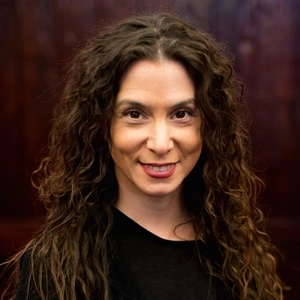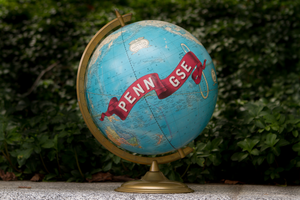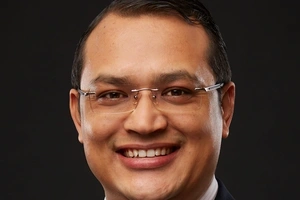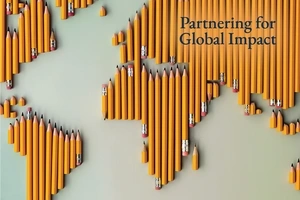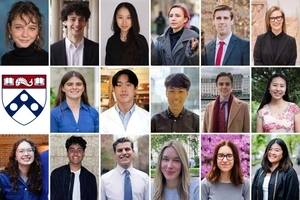Faculty Expert
Empower Families for Innovative Philanthropy participants from Hong Kong and South Africa take part in a pre-pandemic ERFIP workshop. Photo courtesy of Francois du Chatnet.
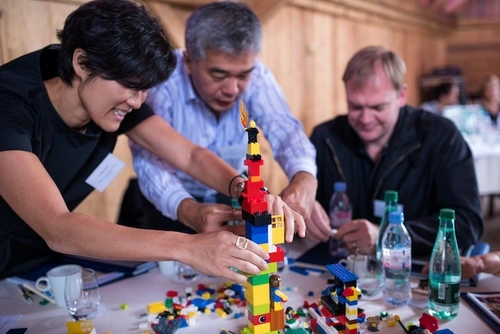
The United Nations, national governments, and non-governmental agencies have set ambitious goals to improve education, reduce poverty, and increase sustainability across the developing world.
But the funding to achieve those goals is lacking, especially in the Global South. Which is why it’s important that investments make a lasting impact.
Recently Penn GSE Professor of Practice Sharon Ravitch, alongside post-doctoral fellow Reima Shakeir and Gul Rukh Rahman of the Edmond de Rothschild Foundation, released case studies of eight successful family philanthropies operating in the Global South.
The profiled organizations — Azalaï Foundation (Mali), EdelGive (India), Instituto Inspirare (Brazil), James Chen (Hong Kong, Rwanda), Koç̧ Foundation (Turkey), Luker Foundation (Colombia), Plastic Waste Classrooms Initiative (Ivory Coast), Song Saa Foundation (Cambodia) — are all members of the Empower Families for Innovative Philanthropy (ERFIP), a Swiss-based foundation supported by the Edmond de Rothschild Foundation in New York. ERFIP acts as a bridge between these Global South philanthropies, sharing successful philanthropic approaches and experiences to exponentialize impact through cross-sectoral engagement between the public sector, private sector, and multilaterals.
These case studies demonstrate the power of strategic, collaborative work in partner communities. We spoke with Ravitch and Shakeir about their findings, donor fatigue, and the importance of frontier philanthropy.
Can you contextualize ERFIP’s influence in the work of the cases?
Sharon: The United Nations Development Program’s recent report on family philanthropies argues that the role of frontier philanthropies is far too robust and pivotal to development to be ignored, under-theorized, or under-supported as it currently is.
Reima: Globally, donor fatigue prevails. The United Nations estimates the gap in financing to achieve the Sustainable Development Goals (SDGs) at $2.5 trillion per year in developing countries alone. There is cause and call for the emergence of new, cutting-edge, and sustainable models for philanthropic giving. A successful philanthropy is not only agile and resourceful, it tracks impact and is able to leverage both businesses and civil society through strategic partnerships.
Sharon: Indeed, the time has come to create an active, data-based, responsive development framework that can guide frontier market philanthropy. These cases are a step into that gap.
What is “frontier philanthropy” and why is it important to examine through case study?
Reima: Grounded in the leading-edge work of Empower Families for Innovative Philanthropy (ERFIP), which is founded by the Edmond de Rothschild Foundations, the cases position family philanthropies as vital development actors (i.e., development gap-fillers and non-State actors) in complex and incredibly diverse nations. This collection of Global South family philanthropy case studies offers an unprecedented, deep look into how these game-changing foundations began and what they were a response to in context, how they have changed over time in response to local need and government relations, how they create and enact participatory mechanisms to respond to local needs and resources in real time, the ways that some have pushed back against top-down development mandates and government edicts and others have collaborated with governments and international agencies artfully and strategically so that their work could be sustainable on those settings. And, ultimately, how each family foundation works to strategically and ongoingly improve lives in (and in some cases the systems of) their respective communities and countries.
Sharon: ERFIP saw that there is a need to bring together private businesses, families, and foundations from frontier markets to learn, share, and explore ways to collaborate for effective giving, sustainable impact, and long-term solutions. Uneven development and the failure of many top-down development efforts have, in a multitude of international contexts broadly, and in the Global South specifically, forced those working in developing country contexts to radically rethink their nations’ strategies and create new approaches for equitable development practice, policy, and research.
What makes these case studies unique and useful?
Sharon: There is an emerging corpus of thought pieces focused on the fast-growing emergence of Global South philanthropies. Many of these pieces are “state of the field” summaries or conceptual pieces that stress the vital and urgent need for data-based case studies that help to unearth and demonstrate the specific and contextualized ways that family philanthropies develop and iterate within their specific local and national contexts over time. There is a growing, dire need for systematic, scholarly case study work that pays requisite attention to the details and lessons learned through implementation so that it can be formative.
Reima: The cases are designed to connect theories pertaining to international development and globalization to innovative approaches and sustainable giving strategies that family philanthropies have taken in the realm of local development in frontier markets. These kinds of localized approaches serve to develop new knowledge that can be applied within related philanthropic contexts that work towards the improvement of life conditions, circumstances, and possibilities in the Global South and beyond.
What can other frontier philanthropies learn from the work?
Sharon: ERFIP’s intensive work with family philanthropies in frontier markets of the Global South has generated cutting-edge, invaluable case examples of locally driven development practice that pushes the envelope on what sustainable local development can mean and look like both in situ and at scale. In this collection of place-based case studies, family philanthropies are the central development actor, and, more specifically, we show how they serve as development gap fillers in their respective countries as well as how they are positioned, or more accurately how they have positioned themselves, as meaningful and enduring change agents.
What do you hope is learned from the cases?
Reima: That frontier philanthropies can better inform development in ways that promote and support place-based sustainable solutions and capacity building. The cases share working examples of how — through well-informed, bottom-up planning that is informed by locally collected data and broader local input — these foundations have been able to engage with and mobilize communities, work with policy leaders, comprehensively address issues across localities and, through the use of participatory methods, build concrete solutions to assess local needs and resources.
And I should add that we couldn't have done this work without our Penn GSE research assistants Sebastian Suarez, Michael-Scott Greco, Chirag Gupta, Ian Ganhinhin, and Lourdes Cossich.
